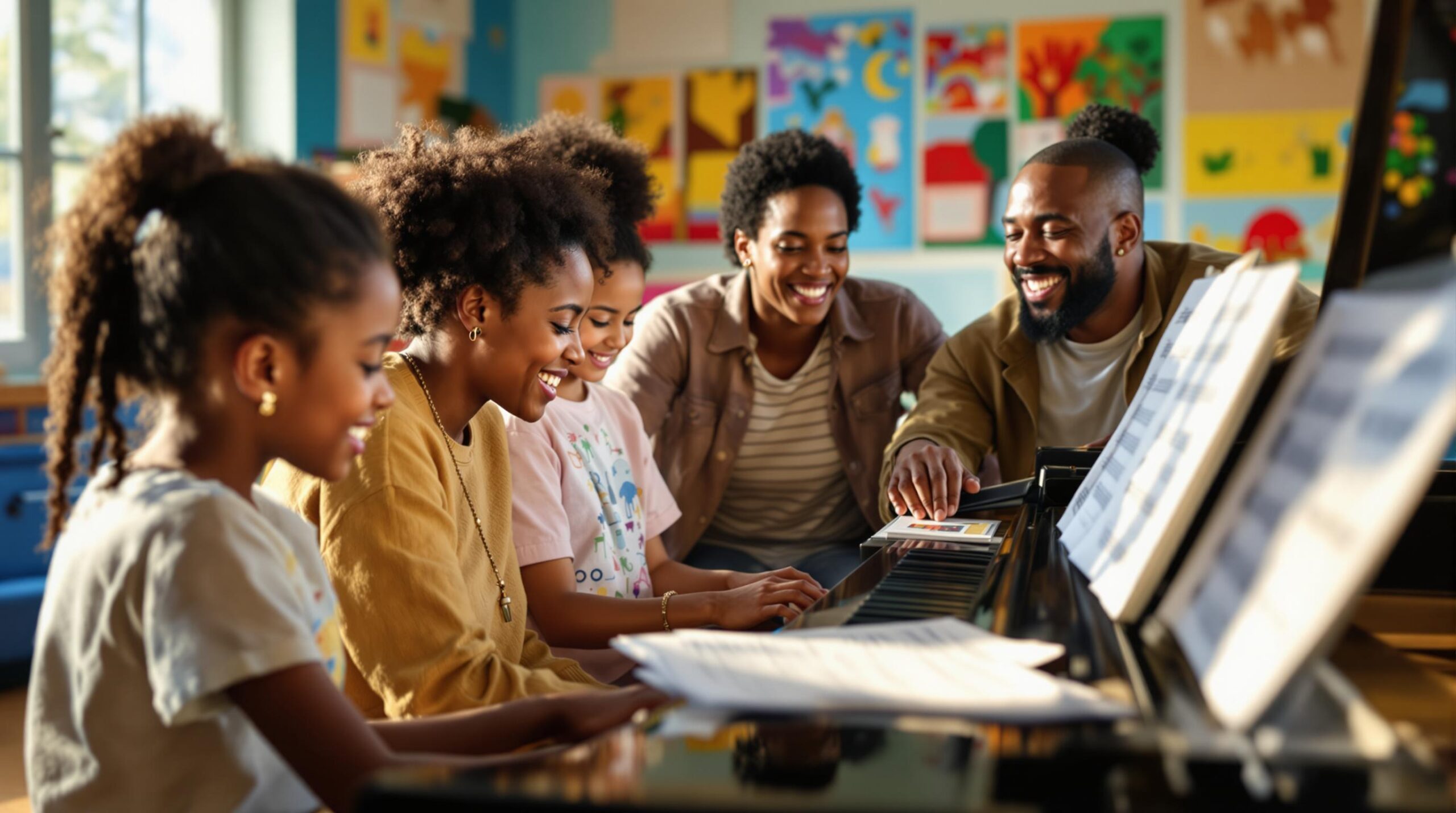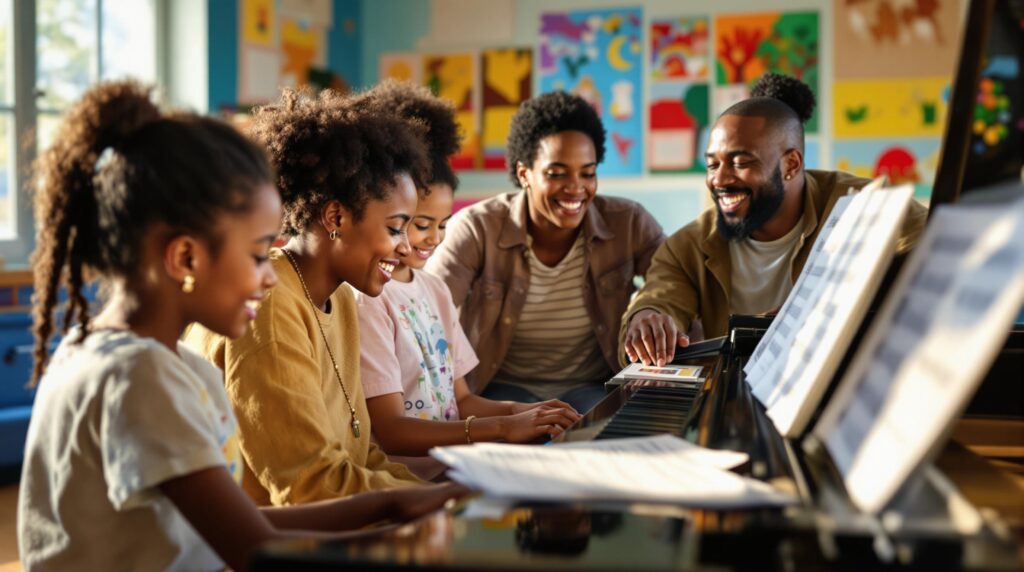
Piano outreach volunteering connects musicians with communities that lack access to music education, offering opportunities to teach, heal, and inspire. Here’s the essence of how to get started and make an impact:
- What It Is: Sharing piano skills with underserved groups, like children, seniors, and healthcare patients, to provide education and comfort.
- Benefits: Improves access to music, supports healing in healthcare settings, and fosters community connections.
- Where to Volunteer: Local organizations (e.g., hospitals, shelters, arts centers), service venues, or online platforms like VolunteerMatch.
- How to Prepare: Brush up on piano skills, choose engaging and appropriate music, and tailor sessions for different audiences.
- Long-term Impact: Build relationships, track progress, and collaborate with community partners to ensure sustainability.
Start small with a weekly session, focus on building connections, and use resources like Cooper Piano for equipment and maintenance. Piano outreach can bring joy and lasting change to those who need it most.
2023 CMS at Art in the Park
Where to Find Volunteer Opportunities
If you’re looking to use your piano skills to give back, there are plenty of ways to get involved. In the Atlanta metro area, Cooper Piano collaborates with several organizations that connect volunteers with opportunities to make a difference. You can explore options through local community groups, service venues, or even online platforms.
Here’s how to get started:
Community Organizations
Cooper Piano works with several Atlanta-based institutions, including Children’s Healthcare at Eggleston and Scottish Rite hospitals, The Nicholas House, Achor Center Women’s Shelters, and Callenwolde Arts Center. These organizations incorporate music into their wellness programs, community events, and educational activities. To join their efforts, you can reach out to program coordinators, attend an orientation session, or sign up for updates to stay informed about volunteer needs.
Service Locations
Places like hospitals, women’s shelters, and arts centers are great environments for piano outreach. Volunteering at these locations often requires a background check and a regular time commitment, but the impact you can make is well worth it. These venues provide a safe and supportive space where your music can truly make a difference.
Online Volunteer Listings
Online platforms like VolunteerMatch are a great resource for finding music-related volunteer opportunities. You can also check out music education forums or local community bulletin boards. Use search terms like "piano volunteer", "music outreach", or "community music program" to discover roles that match your skills and interests.
Getting Ready to Volunteer
Preparation is key to making your piano outreach meaningful. Once you’ve identified where to volunteer, it’s time to focus on getting ready.
Skills to Brush Up On and Music to Choose
You’ll need at least intermediate piano skills, which typically include:
- The ability to sight-read basic sheet music
- A solid grasp of common chord progressions
- Confidence playing in various musical styles
- Basic improvisation techniques
When selecting music, go for pieces that are well-known, engaging, and suitable for the setting. Pick songs that can be adjusted for different skill levels so everyone can enjoy and participate.
Structuring an Interactive Session
Start with a warm-up activity to build a connection. Follow this with an engaging performance that showcases techniques, then involve participants in group activities. Wrap up the session by gathering feedback to make it even better next time.
Tailoring Your Approach for Different Groups
Each group will need a slightly different approach:
- Children: Stick to simple, familiar tunes, and incorporate rhythmic games to keep them engaged.
- Seniors: Play nostalgic music that resonates with them, and allow time for sharing memories.
- Special Needs Groups: Work with facility staff to understand specific needs, use clear and repetitive patterns, and adjust the session’s structure to suit the group.
sbb-itb-b8bc1ab
Creating Long-term Impact
Once you’ve laid the groundwork with engaging sessions, the next step is ensuring your efforts have a lasting effect. Making a meaningful difference through piano outreach takes commitment and thoughtful planning.
Connecting with Participants
Get to know participants on a personal level – learn their names, interests, and track their progress. This personal approach builds trust and encourages them to keep coming back.
Stick to a consistent structure but remain flexible to meet individual needs. Encourage participants to share their musical stories and experiences. This not only creates a welcoming environment but also strengthens the sense of community.
Here are some effective ways to build connections:
- Actively listen when participants share their thoughts or feedback.
- Offer positive reinforcement for their progress.
- Be mindful of cultural preferences when choosing music.
- Check in with participants regularly, either before or after sessions.
Once you’ve built these connections, focus on measuring and documenting your program’s impact to maintain long-term support.
Tracking Program Success
Evaluate your outreach’s effectiveness using both numbers and personal feedback. Quarterly evaluation forms can help gather useful input.
Key areas to monitor include:
- Attendance patterns and participant retention.
- Improvement in musical skills and understanding.
- Social benefits, such as increased interaction and confidence.
- Feedback from participants and staff about the program.
Sharing success stories and progress reports with facility administrators can help secure ongoing support and resources. If the facility already has a piano, partnering with professional services like Cooper Piano can ensure the instrument stays in top shape, keeping your program running smoothly.
Maintaining Your Volunteer Work
To keep your volunteer efforts running smoothly and make a lasting difference, it’s important to focus on structured planning and collaboration.
Managing Your Schedule
Create a volunteer schedule that works with your other commitments. Here’s how to get started:
- Dedicate 2–3 consistent hours each week, factoring in preparation, travel, and breaks.
- Use a digital calendar with reminders to stay organized.
It’s also important to communicate clearly with facility coordinators if your schedule changes. This helps maintain good relationships and ensures the program runs without interruptions. Once your schedule is set, you can focus on building strong partnerships.
Working with Others
Team up with community partners to make the most of available resources. Define roles and expectations early on, and document responsibilities and program goals to keep everyone on the same page. Strong partnerships are key to running a successful program.
Finding Support
To keep your program going, seek support from local organizations and professional services. For example, Cooper Piano offers:
- Piano rentals
- Maintenance and tuning services
- Flexible scheduling (10 AM–6 PM Monday through Saturday, 1 PM–5 PM Sundays)
You can also connect with groups like The Nicholas House and Callenwolde Arts Center [1]. Keep detailed records of your program’s results and gather participant feedback. This information is valuable when seeking ongoing support from facility administrators and community partners.
Conclusion
Let’s recap the key strategies for making your piano outreach efforts impactful and meaningful.
Main Points
Piano outreach brings musicians and communities together, leaving a lasting impression. To make it work, focus on these essentials:
- Consistency matters: Set aside regular time for volunteering and preparation.
- Build strong connections: Partner with local organizations and community spaces.
- Use reliable tools: Ensure sessions run smoothly with quality equipment and resources.
- Track your efforts: Document progress and gather feedback to showcase results.
Next Steps
Looking to dive into piano outreach? Here’s how to get started:
-
Initial Setup
Reach out to local community centers, schools, or retirement homes. Speak with volunteer coordinators to understand their needs – many are eager for new participants throughout the year. -
Program Development
Plan a 45–60 minute session featuring engaging, age-appropriate music. Set clear, measurable goals for your program. -
Resource Planning
Gather the essentials: a well-tuned piano, sheet music, teaching aids, and group activity materials. Consider hiring professional piano services for maintenance if necessary.
Start small with a weekly session and expand as you gain experience and confidence.

